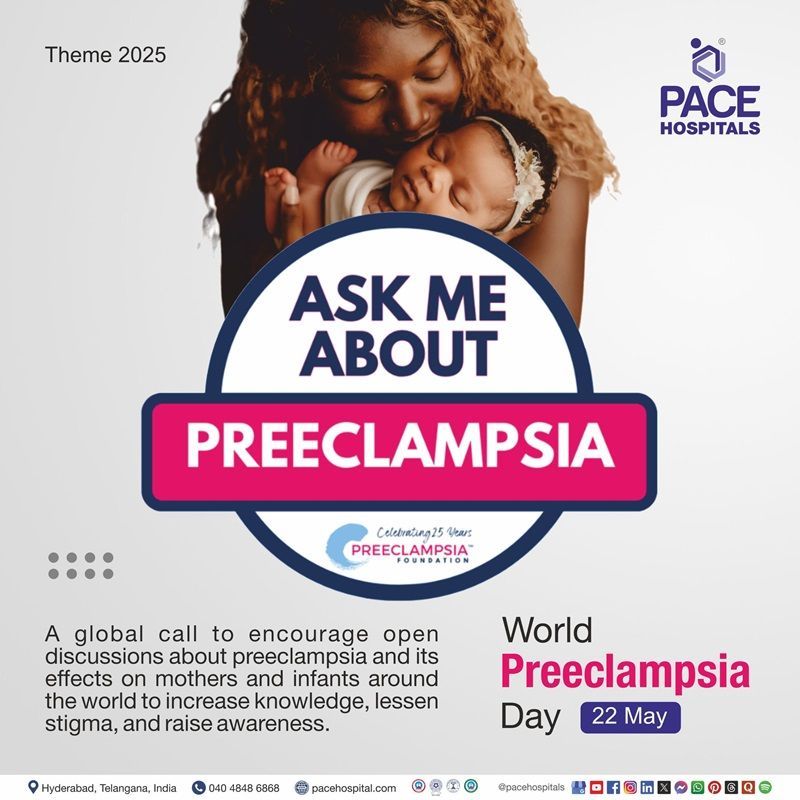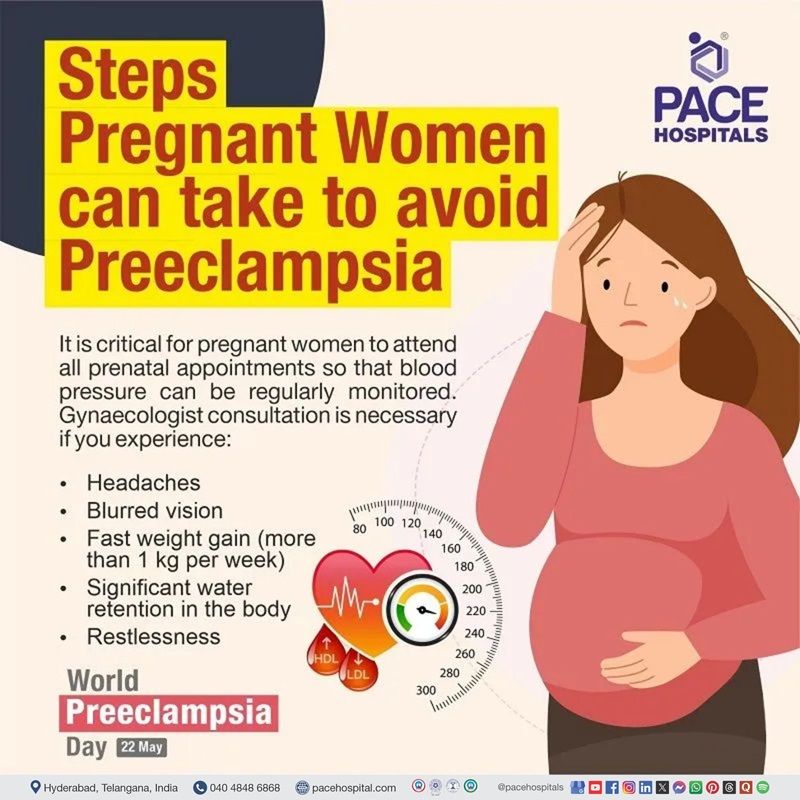World Preeclampsia Day, 22 May 2025 | Theme, Importance & Screening
Pace Hospitals
World Preeclampsia Day is a global healthcare awareness event observed annually on the 22nd of May, intending to recognise and increase the awareness of preeclampsia globally, culminating in its prevention and treatment. This annual event counts as a global call to various local and government healthcare authorities and policymakers to promote the action required to combat preeclampsia.
Preeclampsia is a type of high blood pressure disorder that occurs during pregnancy and can involve multiple organ systems. It is characterised by elevated blood pressure and proteinuria (protein in urine) and can be categorised as mild or severe. Severe preeclampsia includes high blood pressure, heavy proteinuria, and signs of end-organ dysfunction.

World Preeclampsia Day 2025 Theme
This year, 2025, the World Preeclampsia Day theme is "Ask Me About Preeclampsia”. This theme increases open discussions about preeclampsia and its effects on mothers and infants around the world to increase knowledge, lessen stigma, and raise awareness.
Year By Year Themes for World Preeclampsia Day
- World Preeclampsia Day theme 2024: Predict Prevent Prevail
- World Preeclampsia Day theme 2023: Advancing Preeclampsia Research
- World Preeclampsia Day theme 2022: Act Early! Screen Early!
- World Preeclampsia Day theme 2021: Beyond Pregnancy
- World Preeclampsia Day theme 2020: Be prepared before lightning strikes
- World Preeclampsia Day theme 2019: Be prepared before lightning strikes
Importance of World Preeclampsia Day (WPD)
The rise of preeclampsia - Recent research shows that individuals born in the 1990s and 2000s are twice as likely to develop hypertensive disorders during pregnancy compared to those born in the 1950s. Preeclampsia and other disorders can currently affect 8% of individuals giving birth.
Globally, the death of nearly 800 women in pregnancy and childbirth can be prevented with certain measures, especially in low and middle-income countries with the highest mortality rate (99%). An average of 4.5% of preeclampsia cases are reported in India.
During these bleak times, it is necessary to recognise and delegate an event to highlight and emphasise the awareness of preeclampsia and spread the word about its screening, diagnosis, treatment and, if possible, its prevention. World Preeclampsia Day achieves the above said dictums successfully with its growing popularity.
Screening of Preeclampsia
In all the pregnant receiving prenatal care, the preeclampsia screening is performed periodically, but its earlier identification ensures a faster diagnosis which provides closer monitoring and effective disease management.
Preeclampsia screening in the first trimester
Preeclampsia can be detected early on, even in the first trimester, through tests such as blood pressure checks, Doppler scans, and protein measurements between 11–14 weeks. If the test shows an increased risk, changes in diet and lifestyle can be advised to reduce the risk of developing preeclampsia. The earlier the risk is known, the more effective the treatment can be.
Preeclampsia diagnosis in later trimesters
A blood test that analyses two placental proteins throughout the second and third trimesters can predict the beginning of preeclampsia approximately four weeks in advance. With this information, prenatal care appointments may be planned at the appropriate frequency.
Preeclampsia Risk Factors
There is a wide range of factors which increase the chances of preeclampsia development, such as:
- Multiple pregnancies
- First pregnancy
- Pregnancy developed artificial insemination or egg donation
- Chronic kidney disease
- A previous case of hypertension (high blood pressure)
- Diabetes
- Bring overweight
- Pregnancy at a later age or higher maternal age

Steps that pregnant women can take to avoid preeclampsia
It is critical for pregnant women to attend all prenatal appointments. Additionally, blood pressure should be monitored on a regular basis. Gynecologist consultation is necessary in the event of the presentation of these potential warning signs:
- Headaches
- Blurred vision
- Fast weight gain (more than 1 kg per week)
- Significant water retention in the body
- Restlessness
Precautions to reduce preeclampsia
The causes of preeclampsia are mainly unknown, making it difficult to formulate effective primary prevention strategies. However, research has identified advanced maternal age and obesity among other preeclampsia factors. So, avoiding pregnancy in those conditions can be a certain way to avoid the ailment.
Anti-platelet agents and calcium supplementation during pregnancy have been shown to have some benefits for secondary prevention in women at high risk of developing the severe early-onset disease.
The
gynaecologist may prescribe calcium supplementation, which can approximately halve the risk of preeclampsia and also reduces the risk of preterm birth and death or severe morbidity. Nevertheless, it must be understood that only women with low dietary calcium intake are likely to benefit from calcium supplementation.
Share on
Request an appointment
Fill in the appointment form or call us instantly to book a confirmed appointment with our super specialist at 04048486868
Appointment request - health articles
Recent Articles











